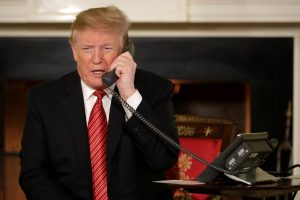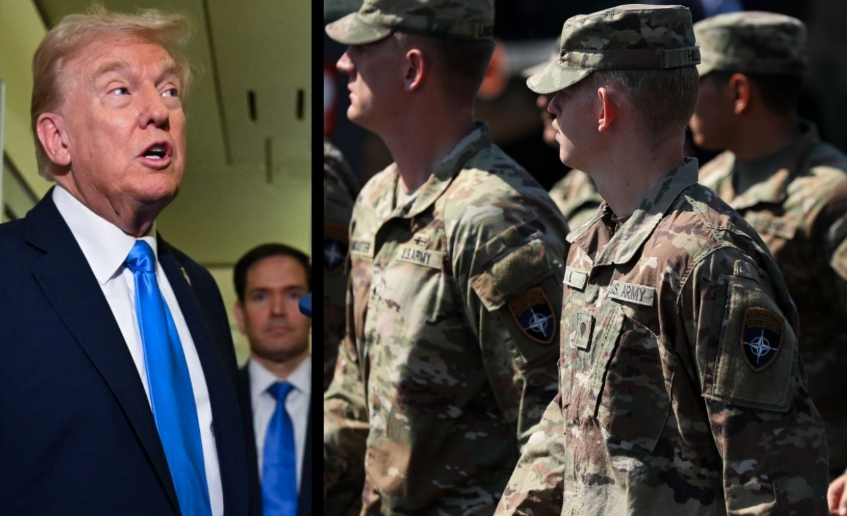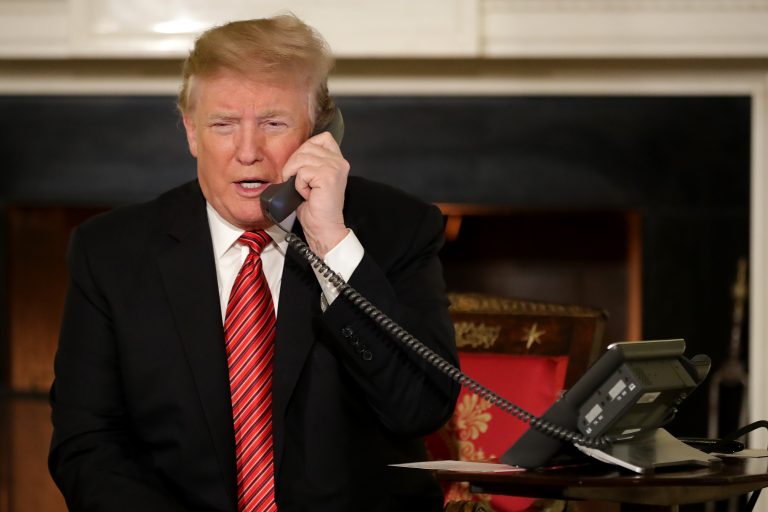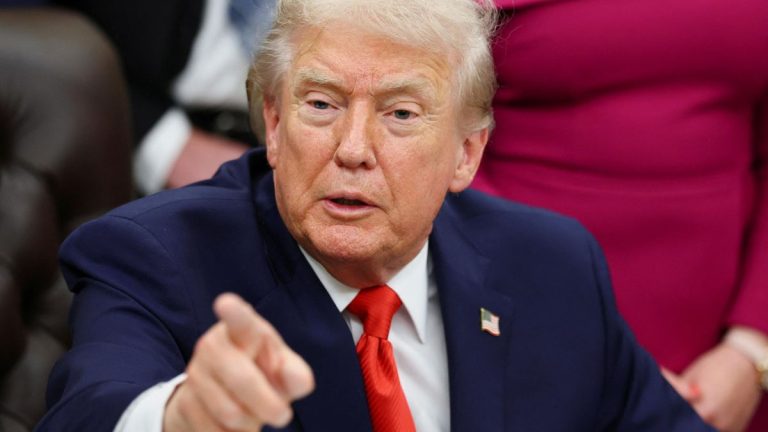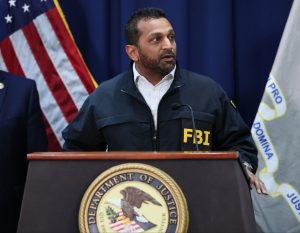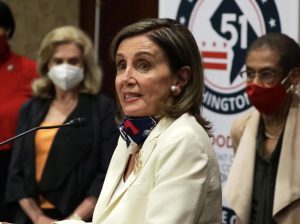In an extraordinary move that has stunned both Washington insiders and military families, a private citizen has stepped forward with a staggering $130 million donation intended to fund the salaries of U.S. troops during the ongoing government shutdown. The gesture, announced by former President Donald Trump, has drawn widespread attention for its unprecedented nature — and raised serious legal questions about how far private money can go in funding the operations of the federal government.
The donation comes as the shutdown enters its third week, with Congress still gridlocked over a federal spending deal. The deadlock has halted pay for hundreds of thousands of government workers, including members of the armed forces who continue to serve without regular compensation.
For days, the identity of the mysterious benefactor remained unknown. Trump, speaking aboard Air Force One last Friday night as he traveled to Asia, said only that “a friend who loves the country and loves the military” had quietly stepped in to ensure that U.S. service members would be paid despite the budget freeze.
“He just wanted to make sure our troops got paid,” Trump said. “He didn’t want credit — he wanted to help. The request for anonymity was pretty unusual in the world I come from.”
That comment set off a frenzy of speculation in Washington and beyond. Who was the billionaire willing to part with such a massive sum to cover military payroll during a politically charged shutdown? And could the government even accept, let alone use, privately donated funds to meet its financial obligations to service members?
A First-of-Its-Kind Contribution
The Pentagon confirmed the donation a day later, stating that it had received a contribution of approximately $130 million, given “on the condition that it be used to offset the cost of service members’ salaries and benefits.”
However, Pentagon spokesman Sean Parnell acknowledged that the department’s legal team was still reviewing whether the money could be used under federal law. “The donation was made on the condition that it be applied directly to the pay and benefits of military personnel,” Parnell said. “We are currently reviewing the legal framework to determine the appropriate course of action.”
The concern stems from the Antideficiency Act, a federal law that strictly prohibits government agencies from spending funds not appropriated by Congress. While the Pentagon can accept donations under certain conditions, it is unclear whether those funds can legally be used to pay wages during a government shutdown — an issue that may ultimately require a legal or congressional resolution.
Trump’s Push to Protect the Troops
The move follows an order from Trump earlier this month, directing Defense Secretary Pete Hegseth to “use all available funds” to ensure military personnel were paid on time, even as the shutdown dragged on. The Pentagon initially responded by reallocating “leftover research and development funds” to meet short-term payroll obligations, but that money was expected to run out by mid-October.
“The troops should never be used as leverage in a political fight,” Trump said in a Truth Social post. “I am using my authority as Commander in Chief to direct our Secretary of War to get our troops paid on October 15th.”
His announcement that a private citizen had stepped in to assist instantly electrified social media and cable news, with commentators divided over whether the donation represented patriotic generosity or a troubling precedent for private influence over federal operations.
The Mystery Man Revealed
By Saturday, the mystery had been solved. Reports from The New York Times, The Guardian, and The Washington Post identified the donor as Timothy Mellon, an 83-year-old billionaire heir to one of America’s most storied financial dynasties.
Mellon, the grandson of industrialist and former Treasury Secretary Andrew Mellon, is known for his reclusive lifestyle and deep pockets. Though rarely seen in public, he has long been active in political giving, donating tens of millions to Republican campaigns and conservative super PACs over the past decade.
In 2024, shortly after Trump’s conviction in a New York fraud case, Mellon made headlines by donating $50 million to the pro-Trump super PAC Make America Great Again Inc., cementing his reputation as one of Trump’s most influential backers.
According to The Guardian, Mellon currently resides in Wyoming, far from the political limelight of Washington, D.C. Forbes estimates the Mellon family fortune at roughly $14 billion, a legacy that traces back to the Gilded Age and the family’s early investments in banking, oil, and aluminum.
While Mellon himself has not commented publicly on the $130 million gift, sources familiar with the matter told The New York Times that he requested anonymity out of respect for the troops and a desire to avoid politicizing the gesture.
Legal and Political Repercussions
Despite the outpouring of praise from Trump supporters, the donation has ignited a heated debate among lawmakers and legal experts. Critics argue that allowing private citizens to fund government obligations sets a dangerous precedent, effectively blurring the line between public duty and private philanthropy.
Under the Antideficiency Act, the federal government cannot spend money that has not been appropriated by Congress, even if it’s offered as a gift. The law exists to ensure fiscal accountability and prevent wealthy individuals or corporations from effectively “buying” government functions.
“The Pentagon’s acceptance of this donation puts us in uncharted territory,” said one senior defense official, speaking to The Washington Post. “This is the first time in modern history that a private citizen has tried to cover military payroll during a shutdown. It raises real questions about the separation of powers and the integrity of the appropriations process.”
Democrats in the Senate also voted last Thursday against a stand-alone measure that would have funded military pay during the shutdown, arguing that such piecemeal funding would reduce the urgency to reopen the government fully. Republicans, in turn, accused them of using the troops as bargaining chips.
The revelation of the private donation has only intensified the standoff. Some lawmakers have praised the gesture as a selfless act of patriotism; others have denounced it as a political stunt designed to undermine congressional authority.
A Symbol of a Broken System
Regardless of one’s view, the $130 million donation has become a powerful symbol of Washington’s dysfunction — and the widening gap between political rhetoric and governance.
“This moment perfectly captures where we are as a country,” said political historian Dr. Evelyn Carter. “You have a billionaire stepping in to do what Congress can’t or won’t do. It’s both an act of generosity and an indictment of the system.”
Military families, meanwhile, have expressed cautious gratitude. For many, the donation offers at least the hope of relief during an uncertain period. “If someone is willing to help us get through this, we appreciate it,” said one Army spouse at Fort Bragg. “But it shouldn’t have to come to this. The government should take care of its own people.”
An Uncertain Future
As the shutdown continues, Pentagon lawyers are still determining whether the money can actually be used. For now, the $130 million sits in limbo — a testament to both extraordinary generosity and the rigid legal framework of U.S. governance.
If the Department of Defense ultimately rejects or delays the use of the funds, it could reignite a broader debate about the limits of private intervention in public institutions. If accepted, it could set a precedent that reshapes how the government handles financial crises during political stalemates.
Either way, the episode has already made history. A private citizen, acting outside the machinery of government, has done what Congress could not: put money on the table for America’s troops.
Whether that act is remembered as a noble gesture of patriotism or a troubling sign of systemic failure will depend on what happens next.

Emily Johnson is a critically acclaimed essayist and novelist known for her thought-provoking works centered on feminism, women’s rights, and modern relationships. Born and raised in Portland, Oregon, Emily grew up with a deep love of books, often spending her afternoons at her local library. She went on to study literature and gender studies at UCLA, where she became deeply involved in activism and began publishing essays in campus journals. Her debut essay collection, Voices Unbound, struck a chord with readers nationwide for its fearless exploration of gender dynamics, identity, and the challenges faced by women in contemporary society. Emily later transitioned into fiction, writing novels that balance compelling storytelling with social commentary. Her protagonists are often strong, multidimensional women navigating love, ambition, and the struggles of everyday life, making her a favorite among readers who crave authentic, relatable narratives. Critics praise her ability to merge personal intimacy with universal themes. Off the page, Emily is an advocate for women in publishing, leading workshops that encourage young female writers to embrace their voices. She lives in Seattle with her partner and two rescue cats, where she continues to write, teach, and inspire a new generation of storytellers.
